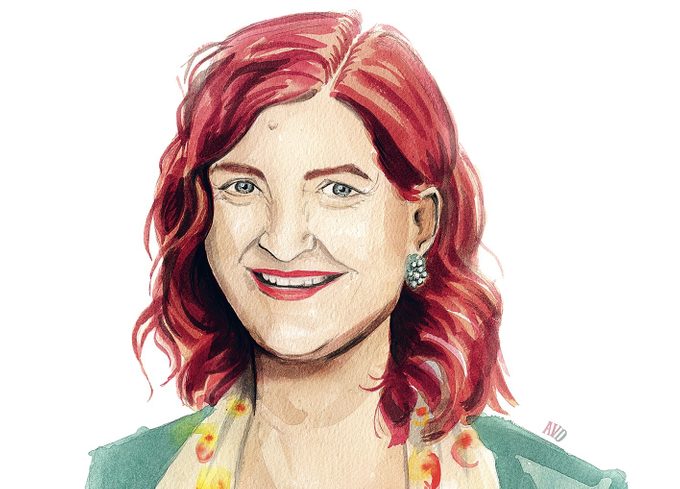Emma Donoghue: The RD Interview
Room writer Emma Donoghue on claustrophobia, the cruelty of child readers and her mysterious new novel.

15 Minutes with Writer Emma Donoghue
Reader’s Digest: Since your early 20s, you’ve made a living as a writer-mainly of novels, including your big hit, 2010’s Room, which you then turned into a screenplay. Do you ever fantasize about less wordy pursuits?
Emma Donoghue: It wouldn’t really occur to me to spend my time on earth on anything but words. I have no other skills. This is it, so it better work!
Your new book, The Wonder, is about a girl in 19th-century Ireland who’s lived without food for months-or so it seems. Most of the story takes place in a small bedroom, a similar setting to the one in Room. What’s the appeal?
You would think I’d had a very strange upbringing! I’m interested in isolating certain relationships and moving up very close, but it was only once I stepped back that I thought, “Oh, it’s another ‘trapped in a room with a child’ book!” I find motherhood to be very intimate and at times claustrophobic, so I think that’s mostly what sent me off on this riff of exploring near-captive conditions.
Why set this book in the past? Eating disorders are very contemporary.
Nowadays, we’re good at labelling psychological phenomena. A century or two ago, these issues were much muddier. There were competing models-superstitious, religious, scientific. So you get diversity, sheer confusion, which is great for fiction.
Earlier this year, you snagged an Oscar nomination for Best Adapted Screenplay for Room. Screenwriting is working out for you, then.
It’s great to try on a whole new kind of writing in your 40s, because it makes you feel like a beginner again.
You don’t find that uncomfortable?
It’s fatal to be comfortable when it comes to writing. Emigration has been handy to me in that way. I feel like an outsider in France, where my partner is from, a different outsider at home in Canada, and a different outsider back in Ireland, where I was born. That sort of oblique vision lets you see things oddly and newly; the less cozy and comfortable you are, the better.
One of your upcoming projects is a kids’ book called The Lotterys Plus One. How cozy was that process?
I feel like a rank amateur. Children can be very harsh. They aren’t polite the way adult readers are-they have to be gripped on every page.
A character in the book has dementia, which your mother suffers from. Was that difficult to write about?
I’ve never been to therapy and I think it’s because anything in my life that’s remotely painful I work through in fictional form. There’s little we can do about dementia, so writing about it has felt hugely helpful. Many children’s books that touch on the subject do it in a saccharine and dreary way. I made it my personal mission to use dementia without having the whole book grind to a miserable halt.
Were your kids your initial readers?
I bribed my son, now 12, and some of his friends to be my first focus group. My nine-year-old daughter is reading the proofs and offering last-minute suggestions. They’ve been extremely useful-and occasionally I’ve been able to distract them from an oncoming tantrum by saying “Oh, we put this bit in the book.”
Her new book The Wonder comes out on Sept. 20.



